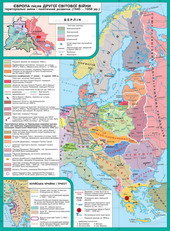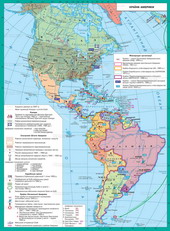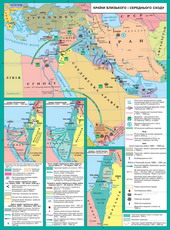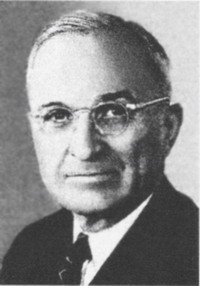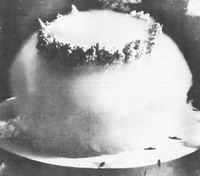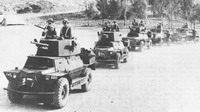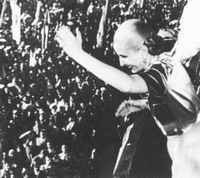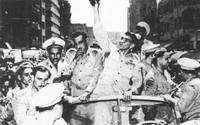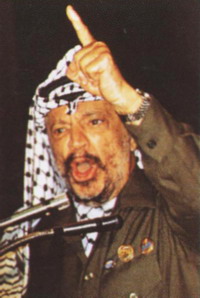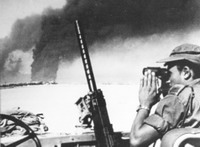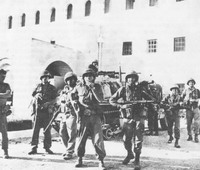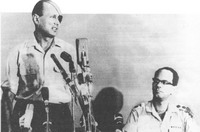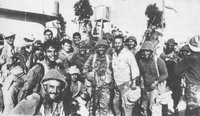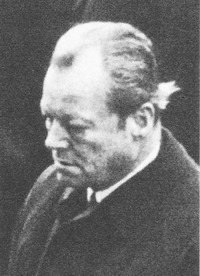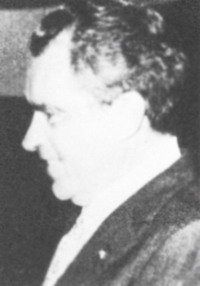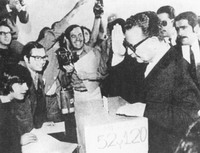§12. United States in 1980, at the beginning of.
1. U.S. in the "conservativeRevolution. Presidency Reagan and Bush
In the elections of 1980 wonRepublican Ronald Reagan. He started the period in U.S. history, whichcalled "conservative revolution (wave).
In his domestic policy, Reaganproposed course, called "reagonomic. It is based wasrestrictions on the program state role in economic and socialregulation (monetarism). The shift from direct to moreindirect government intervention in the economy. The bank tax reformbenefits introduced, energy corporations, likvidovuvavsya price controls onoil. At the same time was introduced tough anti-inflationary policyshortened the cost of the state apparatus and social programs.
These measures helped to stop militaryinflation and, beginning in 1983 economic recovery began. Muchstrengthened the effectiveness of the U.S. economy and its ability to implementlatest achievements of scientific and technological progress. Increased inflow of foreigninvestment by European countries and Japan. Foreign investmentcontributed to the qualitative transformation in the American economy.
«Reagonomic»
|
Main Events
|
|
·
Support for private initiative.
·
Retrieved from severe regulation business.
·
Cutting costs for all government departments except the Pentagon (military).
·
Reducing federal spending.
·
Reduce taxes.
·
The orientation of social policy on average class.
|
|
Results
|
|
Positive
|
Negative
|
|
·
Overcoming the crisis, improvement economic conditions.
·
Increase the fate of knowledge-intensive industries economy.
·
Attract foreign investment.
·
Expansion of the service sector.
·
Rearmament U.S. military.
|
·
Foreign investment exceeded U.S. foreign assets.
·
Increased competition from manufacturers from Europe and Japan.
·
The growth of military spending.
·
Growth of national debt.
·
Increased social stratification.
|
In the period of Reaganwas held re the U.S. Army and began work on establishingmissile defense elements of military space (so-called strategicDefense Initiative - SDI ADB program "Star Wars"). These actionsaccompanied by anti-communist and anti-Soviet propaganda. The USSR wasdeclared "evil empire" against which you want to"Crusade". However, Reagan proved to be flexible. In1985 He began talks with the new Soviet leader Mikhail Gorbachev,which opened a new page in world politics and led to the end"Cold War".
I wonder
One of the foreign sharesReagan gave him considerable trouble and resulted in a long political scandalwhich was called "Iranheyt. The point was that the U.S. secretlyindirectly supplied the weapons and spare parts to one of its mainenemies - Iran, which waged war with Iraq. The money went to financebattle groups "Contra" which fought on the Sandinista(Pro-Soviet, prokubynskoho) regime in Nicaragua. This scandal almostcost the Reagan presidency.
A memoir of the Reagan beginning hispresidency
"In 1981 when I tookpresidency in the White House, the soft muscular fibers of the U.S. militarysoft yaza was so atrophied that our ability to successfully repel a possibleattack by the Soviet Union was very questionable: not fly fighter jets, combatship sailed for chronically sufficient to spare. Our best sons anduhodyly daughter of military service, the morale of the Volunteer Army was in decline, our strategic weapons- Missiles and bombers (our main force containment) - not decadesmodernized. At the same time the Soviet Union created a military machine thatthreatened to beat us on any level.
I wanted to sitthe negotiating table to end this senseless policy of "mutualAssured Destruction, but that America must first beincrease its military strength. Then we could negotiate with the Soviets from a positionstrength, not weakness».
Positivechanges in the life of the United States have been fixed after taking over the Republican George Bush (Senior), who alsoeight years was vice-president. Bush was not a popular politician, but asProfessor Galbraith argued: "Representativesfat and satisfied America was more they played a crucial role inelections. They are preferred Bush's assurances. What exorbitant costssocial needs will not solve all social problems will not save people fromsuffering and poverty. Bush just promised to help those who really need itHe promised to create a society "good, sensitive people».
Despite the fact that when itCongress controlled by Democrats, Bush failed to reach agreement betweenRepublicans and Democrats on major issues of internal and externalpolicies and ensure effective implementation of its policies. Prominentpoints in the program belonged on the fight against drug addiction,development of education, health, and environmental problems. The main problem overwhich always worked his administration is the budget deficit. What everincreased. Somewhat undermined its credibility problems caused by economic slowdown1990-1992 biennium, which were caused by negative manifestations reagonomic.
In international relations reachednew agreements with the Soviet Union (later Russia, Ukraine,Kazakhstan, Belarus) on nuclear arms reduction. Finally solvedGerman Question (in 1990 Germany yednalasya objects). Bush authorized the aggressionAmerican troops in Panama under the pretext of fighting drug abuse(1989). His greatest achievement was winning the war with Iraq byliberation of Kuwait in 1991 ("Desert Storm").
2.Bill Clinton's Presidency
In 1992 presidentialBush elections, with the authority of the winner, unexpectedly defeated by the youngand little-known Democrat, governor of Arkansas Bill Clinton. The defeat marked the completion of Bush's "conservativeRevolution, which for 12 years carried out the Republicans. Turn inAmerican sentiment was caused by their desire of social protection, greatersocial role of the state.
The new president had justmeet the problem of ethnic unrest in Los Angeles, which hadsuppress troops. These riots showed the presence of significantSocial conflicts with an ethnic basis. "Color" of the U.S. populationis significant mass of the population below the poverty line. To gaincommitment of the administration of the population has resorted to broad socialprograms.
In 1994, Republicans tookrevenge for the elections to the Senate and Chamber of Deputies. However, this does not help them toPresidential election 1996 Clinton again won.
During its stay in the WhiteHouse Bill Clinton did not resort to radical reforms, providing pragmaticpolicy. However, it launched the reform in education and health,social security. Due to his rule isthe further gradual U.S. economy, creatingadditional 10 million jobs, halve the state deficit (andafterwards appeared even surplus - the excess of revenues over expenditures)combating drug trafficking.
I wonder
Since the presidency of Bill Clintonconnected a series of piquant scandals connected with private lifepresident. It has been repeatedly accused of sexual harassment toWhite House employees. A scandal about the sexual relationship with Monica Lewinskyeven led to what was used against the President of the procedureimpeachment (though the voting was not attained sufficientvotes). The main accused in what the president is not the sexual relationship withinternship at the White House, but because he lied, denying them.After all, Americans forgave his love pohodenky president, and wifecourageously withstood all the twists and turns scandal. After the presidentialterm man she broke the marriage with him. Hillary Clinton all the timehusband's presidency played a prominent role in politics,adviser was a man.
In foreign policy, Clintonin favor of NATO expansion, for U.S. participation in the settlement of regionalconflicts and peacekeeping actions. Generally the U.S. after the collapse of the USSR, asthe only superpower, trying to create a global security system, involvingits all powerful state and structure of the world. In carrying out itsforeign policy of the U.S. resorted to any means: from peace tomilitary (bombing, rocket attacks, the introduction of troops). SeriousU.S. foreign policy moves during the Clinton presidency weremilitary operations in Somalia, Haiti, Bosnia, Iraq, Afghanistan, Serbia (Kosovo).
3. U.S. at the beginning of. Bush Presidency -Jr.
Election 2000 were particularlyin U.S. history, they have become a test for American democracy, the electoral system.For the first time created a situation where candidates for the Republican (George W. Bush)and Democrat (Al Gore) received the same number of votes. After long andrepeated recount preference was given to Republicans. Thissituation showed that in American society there is no urgent problemson which decision to mobilize the whole society.
The relative economic prosperityenabled Bush Jr. administration attention focused onforeign policy. In addition to this obligation and the linking of the U.S. in the world. Butactive U.S. intervention in all points of tension that exist in the world, ledincrease anti-American sentiment. September 11, 2001 was a turning pointlife in the U.S. and the world. On that day there was a terrorist attack, which resulted indestroyed the World Trade Center in New York and damaged the buildingPentagon (DOD). The victims of the terrorists were about 5 thousandpeople. This terrorist attack showed the danger of terrorism. USA were putthe need to deploy large-scale terrorism. Thisstruggle opened in several areas: conflict resolution hot spots of the planet, change of governments in thosecountries that support international terrorism, the elimination of the economic baseterrorism, combating terrorist groups and others. To fight againstterrorism anti-terrorist coalition formed of the world led by the United States.The first major event was the U.S. intervention in internal affairs of Afghanistanside forces that howled against the Taliban movement (this movement supported activitiesterrorist network al-Qaeda led by bin Laden, which is responsible forresponsibility for the attack on September 11, 2001 and a number of otherterrorist acts). In the winter of 2002-2003 U.S. launched a massiveanti-Iraq campaign to overthrow President Saddam Hussein. Himzakydalosya desire to acquire weapons of mass destruction, forambitious plans in the region. In March-April 2003 U.S. and UK troopshad a brilliant operation to topple Saddam Hussein. However, povalyvshyregime, the U.S. and its allies in the occupation of the country facing massive partisanmovement, supporters of the former regime, Sunni and Shiite uprising. June 302004 U.S. transferred power to the Iraqi administration, restoring sovereigntycountry. But the situation in the country is uncertain.
The consequences of war will have a lasting impact on the world, region andUSA. The victory over Saddam Hussein's regime is not resolving the main task of linkingcombating terrorism.
Also, the millenniumand economic problems brought to the United States. A wave of bankruptcies of largeU.S. companies. Was a significant fall in shares of companies related to the "neweconomies "(the field associated with digital technologies and programmaticSecurity), which in previous decades show phenomenal growthgrowth. All this has put Bush administration threatenedeconomic crisis.
An important event in U.S. history wasadoption in December 2003 U.S. Supreme Court decision on the changefinancing of presidential elections.
In the 2004 elections victory inpresidential race Bush won again - junior.
At the end of his presidency fellEstimated Financial, which grew into an economic, crisis, that covered allcountries.
In presidential elections2008 winner Democrat Barack Obama.
Results
Between the end of XX - beginning of XIX century. fundamentally changing the U.S. role in the world. Aftercollapse of the USSR they were left alone superpower. Therefore, all their policies,both internal and external, are dictated by and aimed at confirming thisstatus.

Startreusable spacecraft. Florida, USA
Questions and tasks:
1. What is a "conservative revolution"? In the period of which U.S. presidentsit falls?
2. Describe the presidency Reagan. What steps have beentaken to implement the strategic plan of Reagan? Did heachieve this goal?
3. Reason for re R. Reagan initiated the U.S. Army?
4. What are the main achievements of the Bush presidency - a senior?
5. What caused the Clinton victory in elections in 1992?
6. What are the achievements of the presidency Bill Clinton?
7. What is special election in 2000? Who won at theseelections?
8.
What is the U.S. role in the modernworld? What is the essence of events September 11, 2001?
9. Former U.S. Secretary of State H. Kissinger in his book "Diplomacy" states: The End of the Cold War begat even moretempted to remake the world in the American example and likeness? CompletionThe Cold War created a situation that numerous observers have called"Unipolar" or "mono suprastate world. But the United States actuallyare not as brilliant position to unilaterallydictate the global international activities. What the events of recent years canbe illustrated with the conclusions of G. Kissinger?
10. Who won the election in 2008 in the U.S.? What factors played a decisiverole in his victory?
I wonder
Table. "U.S. Presidents second half of the twentieth -the beginning of. "
|
Presidents
|
Years tenure
|
Party accessory
|
Internal Doctrine
|
Foreign Policy Doctrine
|
|
H. Truman
|
1945-1952
|
Democratic
|
"Fair exchange"
|
"Containment of Communism
|
|
D. Eisenhower
|
1953-1960
|
Republican
|
"Zgoda" (Consensus), "normality"
|
"Rejection of Communism" (Liberation) "Knead retribution" and "filling vacuum"
|
|
D. Kennedy
|
1961-1963
|
Democratic
|
"New Frontiers"
|
"Flexible Response", "Union for the sake of progress, "a Peace Corps
|
|
L. Johnson
|
1963-1968
|
Democratic
|
"Great Society"
|
"Flexible Response"
|
|
R. Nixon
|
1969-1974
|
Republican
|
"New Economic Policy
|
"Huamska Doctrine" (a country that has undergone Communist aggression receives U.S. assistance, but provides a living force) relaxation (a "realistic deterrence")
"Atlantic unity."
|
|
Dzh.Ford
|
1974-1976
|
Republican
|
"Niksonomika without Nixon"
|
Discharge ("realistic deterrence") "Atlantic unity"
|
|
Dzh.Karter
|
1977-1980
|
Democratic
|
"Strict Economy", reaching "full employment" "Honest, open government"
|
Doctrine "moral values." "Rapid Response"
|
|
R. Reagan
|
1981-1988
|
Republican
|
"Reagonomic"
|
"Intimidation" and "direct confrontation" SOI (Star Wars)
|
|
Bush
|
1989-1992
|
Republican
|
"Reagonomic no Reagan '
|
"Containment and deterrence"
|
|
Clinton
|
1993-2000
|
Democratic
|
Renaissance America
|
"Global leadership" ("Grand Strategy")
|
|
Bush - Junior
|
2001-2008
|
Republican
|
|
The doctrine of "Preventive Self-Defense
|
 English
English

